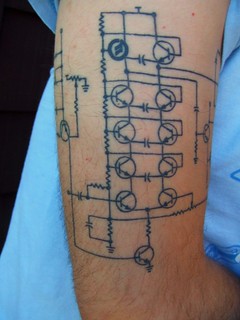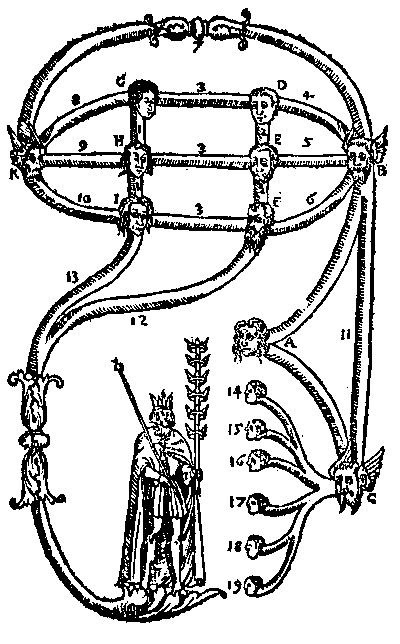 Ground Zero Man warns us that feeding too many equations into the right side of the experimental subject's head can cause his left ear to turn into a cauliflower. The story is loosely based on a Magritte painting, as emphasised by the cover artist when the book was re-issued with a different title.*
Ground Zero Man warns us that feeding too many equations into the right side of the experimental subject's head can cause his left ear to turn into a cauliflower. The story is loosely based on a Magritte painting, as emphasised by the cover artist when the book was re-issued with a different title.*

An extract:
The theory of Morphic Resonance predicts that once one author has imagined a device for which the circuit schematic is as effective as your actual hardware wire-and-capacitors circuit, it becomes easier for other authors to invent devices of their own. Especially when the resonance is enhanced by reckless and hubristic experiments bordering on scientific malpractice with the Morphogenic Field Flux Intensifier, such as anyone might commit after a few pints of the Winterstipple Scrumpy with Nightshade for Vitamin C. Sure enough, here are Pratchett and Baxter with the Stepper:
To be all scholarly with the attributions and precedents, Shaw was not first either and Ground Zero Man was only possible because John W. Campbell Jr. had earlier dreamed up the Symbolically Functioning Hieronymus Machine.
See how it works! Eloptic energy cannot be detected by mere electrical contrivances; but when it flows along the printed ink or graphite on paper, modulated and filtered by the symbols, it achieves the designer's purpose by interacting with the consciousness of the human operator, whom we shall call the 'reader'.
It is not known how Campbell felt about the cargo cults springing up across Melanesia in the wake of WWII troop movements... he might have dismissed them as superstitions of ignorant magical-thinking tribes, or recognised that a bamboo scaffolding can channel eloptic energy and become a symbolic machine as fit for purpose as a physical flight tower. Libertarian, after all.
Results not guaranteed for on-screen versions
Complete circuit schematics and assembly instructions for the Morphogenic Field Flux Intensifier are available in the Riddled Gifte Shoppe, in illuminated and non-illuminated formats. They are printed in conductive ink and therefore work in their own right without the need for actual construction. The price may seem high but remember that when purchasers can memorise and visualise the diagram, they no longer need it and can on-sell it to some Sadly, wearing a tattoo of a transistor ladder filter on one's arm does not turn one into a Moog Synthesiser. Still it was worth a try. If this cycle of morphic facilitation continues, eventually I will be able to have a tattoo of the circuit diagram for a tattooing machine and it will be able to copy itself onto other people's skin.**
Sadly, wearing a tattoo of a transistor ladder filter on one's arm does not turn one into a Moog Synthesiser. Still it was worth a try. If this cycle of morphic facilitation continues, eventually I will be able to have a tattoo of the circuit diagram for a tattooing machine and it will be able to copy itself onto other people's skin.**Also it will be possible to draw a flow chart on a screen, and that will be equivalent to writing an actual computer program.
 * Bonus Ground Zero.
* Bonus Ground Zero.** All my tattoos are in invisible ink, so they will only show up (briefly) in the crematorium.





6 comments:
Also it will be possible to draw a flow chart on a screen, and that will be equivalent to writing an actual computer program.
This is also known as UML, partially implemented as e.g. Rational Rose.
a few pints of the Winterstipple Scrumpy with Nightshade for Vitamin C
Needs more artemisia.
Also it will be possible to draw a flow chart on a screen, and that will be equivalent to writing an actual computer program.
QUIT MAKING FUN OF ME.
You can't write fine spaghetti BASIC if you waste time making flow charts.
~
This is also known as UML
Unpossible!
Actually, yeah. Though a huge amount of effort and attention was put into UML and into the whole Design Patterns thing, it never really worked well, especially since it is not very "agile". Rational Rose is still sold and supported by IBM who bought the company more than a decade ago. The whole concept mainly took off in real-time systems, like running trains, or so I gather. Very hardware engineering-y sorts of environments, where people think in terms of components rather than abstractions/data to be processed.
Post a Comment